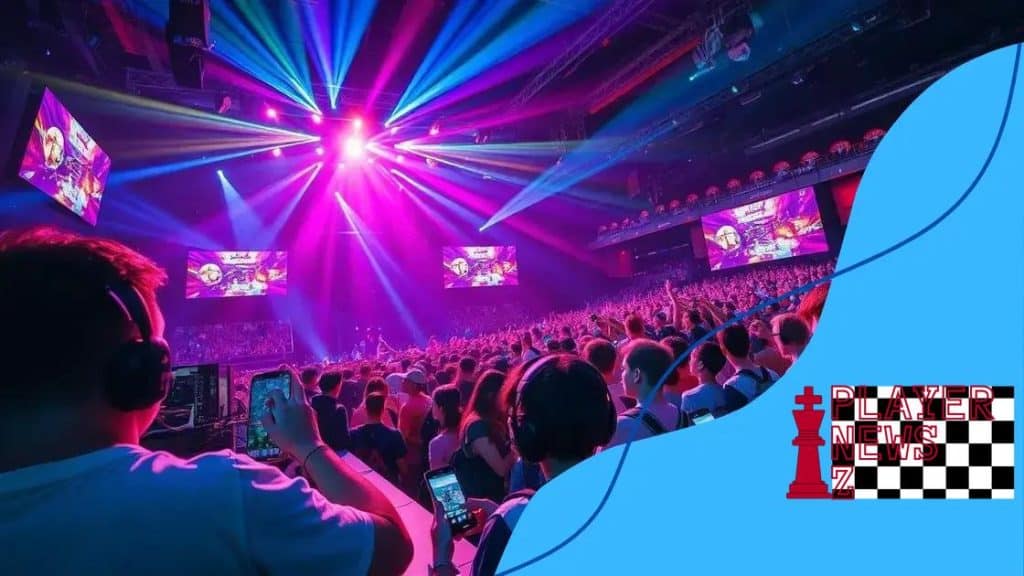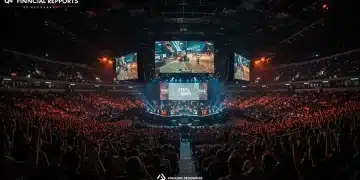The impact of social media on e-sports growth

The impact of social media on e-sports growth is profound, enhancing player visibility, fostering community engagement, and shaping the industry’s future through trends like VR integration and influencer marketing.
The impact of social media on e-sports growth is something we can’t ignore. It’s fascinating to see how platforms like Twitch and Twitter have transformed the landscape, connecting fans and players in unprecedented ways. Have you considered how this dynamic affects your favorite games?
The rise of social media in e-sports
In recent years, there has been a remarkable rise of social media in e-sports. This evolution has transformed how players connect with their audiences and create vibrant communities around their favorite games. Social media platforms have revolutionized the way fans engage with e-sports, enhancing visibility and accessibility.
Key Platforms for E-sports Growth
Several social media platforms have played a crucial role in this growth:
- Twitch: This platform allows gamers to stream live content, enabling real-time interactions with viewers.
- Twitter: Quick updates and announcements can be shared, keeping fans informed and connected.
- Instagram: Visual storytelling helps promote events, players, and brands in the e-sports arena.
- YouTube: Video content showcases highlights, tutorials, and player profiles, enriching the e-sports experience.
As fans share their thoughts on social media, they create a culture of engagement that fuels the interest in e-sports. This interaction has made it easier for new players to enter the scene, as they can build a following and gain recognition with the help of social media. Players and teams often engage directly with their fans, fostering loyalty and community.
The Role of Influencers
Influencers also contribute significantly to the rise of social media in e-sports. They attract large followings and become trusted voices within the community, promoting games, tournaments, and brands. Their recommendations can influence purchase decisions, leading to higher sales for those in the e-sports industry.
This interconnectedness allows fans to feel part of the journey, creating an emotional investment in their favorite teams and players. The impact of social media in e-sports is undeniable, shaping how the industry grows and evolves.
How platforms boost player visibility
Platforms play a vital role in how e-sports players achieve visibility. By leveraging social media, video streaming sites, and gaming communities, players can showcase their skills to a broader audience. This exposure can lead to opportunities that might not have been possible otherwise.
Understanding the Mechanisms
Different platforms have unique ways of boosting player visibility:
- Live Streaming: Players can stream their gameplay on platforms like Twitch, allowing fans to watch in real-time.
- Social Media Posts: By sharing updates and highlights on platforms such as Twitter and Instagram, players can keep their followers engaged.
- Video Content: Creating content for YouTube allows players to demonstrate strategies and personality, building a loyal viewer base.
- Community Engagement: Participating in forums or discussions on platforms like Discord helps players connect with their fans on a more personal level.
This kind of visibility can lead to sponsorship deals, higher tournament invitations, and a stronger fan base. Engaging directly with followers helps players build a distinct personal brand, which is crucial in the crowded e-sports landscape. Moreover, when players collaborate with other influencers, they cross-promote each other, reaching entirely new audiences.
Impact of Player Interaction
Interaction with fans can significantly enhance a player’s visibility. Streaming sessions often involve chatting, responding to comments, and fostering a supportive community. This personal touch makes fans feel valued and connected to the player, thus encouraging them to share content further.
Ultimately, platforms are not just tools; they are powerful gateways that can propel players into the spotlight. Utilizing them effectively can lead to rewarding career opportunities.
Influencer culture and its effects on e-sports

The influencer culture has profoundly impacted e-sports in recent years. Influencers, often gamers with large followings, use their platforms to promote games, players, and events, creating a significant ripple effect in the industry. This has changed how fans perceive and engage with e-sports.
Building Trust and Loyalty
Influencers often establish a strong connection with their audience. This relationship leads to trust, which can affect buying decisions. Gamers are more likely to try a game or support a team recommended by someone they admire. Here are some key ways influencers shape perceptions:
- Authentic Recommendations: Fans look to influencers for genuine advice on games and products.
- Community Engagement: Influencers create a sense of belonging for fans, gathering them around shared interests.
- Live Interactions: Streams and social media posts allow influencers to interact directly with their followers, enhancing community feel.
- Promotional Events: Influencers often host or participate in events, drawing attention and boosting engagement.
This relationship between influencers and their followers creates a dynamic ecosystem within e-sports. As fans consume content from these influencers, they contribute to a growing culture where visibility and support matter. This not only helps new players gain recognition but also elevates the profiles of established players.
Network Effects and Growth
The influencer culture has triggered network effects in e-sports. When an influencer promotes an event or a game, it can quickly gain traction. Their followers share this content, leading to increased visibility across various platforms.
The rise of influencer marketing has also led to brands investing more in e-sports. Companies understand that associating with popular figures can enhance their reach and build brand loyalty. This trend has resulted in sponsorships, partnerships, and a whole new level of marketing in the e-sports arena, fundamentally altering its landscape.
Community engagement through social media
Community engagement through social media has become a crucial aspect of the e-sports industry. This dynamic interaction brings fans and players together, fostering a sense of belonging and loyalty. Social media platforms facilitate conversations, making it easy for fans to connect with their favorite players and teams.
Creating Interactive Spaces
Social media platforms provide various ways for communities to engage:
- Live Q&A Sessions: Players often host live question-and-answer sessions on platforms like Twitch and Twitter. This gives fans a chance to interact directly and ask questions.
- Fan Contests: Many teams and players organize contests that encourage fans to share content, such as fan art or highlight reels.
- Discussion Threads: Platforms like Reddit host discussion threads where fans can share their thoughts about recent games or tournaments.
- Community Challenges: Engaging fans with challenges creates excitement and involvement, often seen on platforms like Instagram.
Such interactions not only make fans feel valued but also help create vibrant, thriving communities. When fans share their experiences and opinions, it further deepens their connection to the sport and its players.
The Power of Hashtags
Hashtags play a vital role in community engagement. They help fans find relevant content and participate in ongoing conversations. Using trending hashtags can boost a player’s visibility and connect them with a wider audience.
Moreover, social media allows players to share their victories and challenges, humanizing them in the eyes of fans. This relatability strengthens community bonds, as fans appreciate seeing the personal side of their favorite players. The mutual support seen in these online communities highlights the positive effects of social media in the e-sports realm.
Future trends in e-sports and social media
Future trends in e-sports and social media are rapidly evolving, shaping how fans interact with their favorite games and players. As technology advances, the way e-sports is consumed will change dramatically. This is an exciting time for both gamers and fans alike.
Increased Integration of VR and AR
One major trend is the incorporation of virtual reality (VR) and augmented reality (AR) in gaming. These technologies will enhance the viewing experience for fans. Imagine attending a virtual e-sports event where you can feel like you are right in the action.
- Immersive Experiences: Fans will be able to engage with the game and players in new, exciting ways.
- Enhanced Engagement: Players may stream in immersive environments, making viewers feel like participants.
- New Content Formats: Innovative content created through VR and AR will redefine how tournaments and games are presented.
As these technologies become more accessible, the connection between fans and the e-sports community will grow stronger.
Growth of Niche Communities
Another trend to watch is the emergence of niche communities within e-sports. With the rise of social media, fans can connect over specific interests. These communities enhance engagement and loyalty.
Platforms like Reddit and Discord facilitate discussions around specific games or teams. Fans can share strategies, experiences, and support one another. This creates a more personalized environment for engagement.
Increased Focus on Mental Health
Finally, there is a growing awareness of mental health in e-sports. Players and organizations are beginning to prioritize well-being. Support from social media plays an important role in this shift.
Resources and discussions about mental health are becoming more common. Players are encouraged to share their experiences, fostering a supportive community. This trend is crucial for sustaining the longevity of players in the e-sports scene.
FAQ – Frequently Asked Questions about e-sports and Social Media
How does social media impact e-sports growth?
Social media amplifies player visibility, connects fans to their favorite teams, and fosters community engagement.
What are some future trends in e-sports?
Future trends include the integration of VR and AR technologies, growth of niche communities, and increased focus on mental health.
How do influencers affect e-sports?
Influencers build trust and loyalty among fans, promoting games and events, and shaping perceptions within the gaming community.
What role does community engagement play in e-sports?
Community engagement enhances fan involvement, making them feel valued through interactions on platforms like Twitch, Twitter, and Discord.





